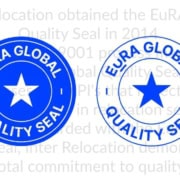Is Relocation the Same as Moving?
“Could you help me move my furniture back to England?” I receive a request like this once every two to three weeks.
That’s great you might be thinking, you run a relocation company and you get regular enquiries. It would be great if I owned that kind of relocation company, what I actually own is known in the industry as a Destination Services Provider (DSP for short).
That’s great if you work in the field of global mobility but for the everyday person, perhaps relocating for the first time, a DSP is probably not a business type you have come across.
What is a DSP and how can it support relocating employees?
Let me clarify what my company, Inter Relocation, does: we provide independent home search services for expatriates, as well as helping them to find a school for their children, orientation support for new arrivals and additional support with anything relating to establishing a life in a new country.
In addition, we also provide in-house visa and immigration support, which is quite typical, at least within the Central and Eastern Europe region. That makes my company an ISP (Immigration Service Provider) as well as a DSP.
A bejegyzés megtekintése az Instagramon
A short history lesson
When I started out in the industry things were a little simpler. Companies like mine were commonly referred to as relocation companies, with our cousins in the removals business calling themselves household goods movers, removals firms, or van lines. Then slowly but surely the removals companies started to call themselves relocation companies, just like we destination services providers had done so, so that things would be clear for the lay person.
The late, great Paul Evans once explained it to me in terms of his goal of ultimately selling his business for a higher price. The basic gist was that household goods moving is a blue-collar logistics business, whereas relocation (encompassing the work of a DSP, ISP, tax and legal and other support services such as language and cross-cultural training) was considered a white collar consulting business. The multiplier of historical or projected profit that you can charge when selling your business is significantly higher if you are selling a consulting business, and that is what he was building.
A bejegyzés megtekintése az Instagramon
Let’s look at the big relocation picture
So back to that request for my company to move someone’s furniture. I take such requests with good grace and do my best to direct the customer to a company that will indeed assist them. It reminds me that relocation encompasses so many processes, of which my company delivers only a few. At this point we must mention the global players in this industry, the Relocation Management Companies (RMCs).
Many multinational companies’ global mobility management have realised that if each of their offices operates its own global mobility policy, it results in a very disjointed experience for their international workers. A typical solution has been to take a global approach and to establish a relationship with a service provider that can support that company’s expatriate employees wherever they relocate to.
This is the role taken by the Relocation Management Companies. Companies like mine partner with RMCs and act as an on-the-ground partner. There could also be immigration, household goods moving, spousal or partner support, tax equalisation and so on, all provided by a network of partner companies around the world.
Relocation is all about people
For me the beauty of our industry is that it is all about people. I do my best to occasionally work with a relocating family, just to remind myself of why we are here. To relocate from one country to another, even as a single person, can be very stressful and to know there is someone who will hold my hand (metaphorically at least) when I arrive in the new location is very reassuring.
There are efforts within the industry to use technology to streamline and simplify the process and I am all in favour of a reduction in administration and in the number of people who contact a relocating employee. For me though there is still no substitute for having an actual relocation and/or immigration consultant to look after an expatriate and make sure they find the right home at the right price, with a lease contract that protects their rights and with the legal right to live in that home and work in the country they’ve moved to.
A bejegyzés megtekintése az Instagramon
Empathy for the expat
I’m an expat too. I relocated to Hungary in 1995 and did so without any professional support. I proudly refer to myself as an economic migrant, because I relocated with two suitcases, a small amount of money and sought a new life, a better life, in Budapest. For me relocation was the freedom to make a choice, to be able to move to another country, without having to prove my worth in advance. I moved to a country with a fresh, entrepreneurial spirit and found myself caught up in that feeling and was running my first business by 1998.
Beer was cheap, the locals were welcoming and loved that I tried to speak their language. My decision to relocate changed my life, beyond all recognition and I sometimes wonder how my life would have turned out if I’d decided not to. I don’t think about that too often though, mostly I’m focused on making sure my team has all the tools they need to relocate the next satisfied and very brave customer.
By Stuart McAlister, owner and Managing Director, Inter Relocation










